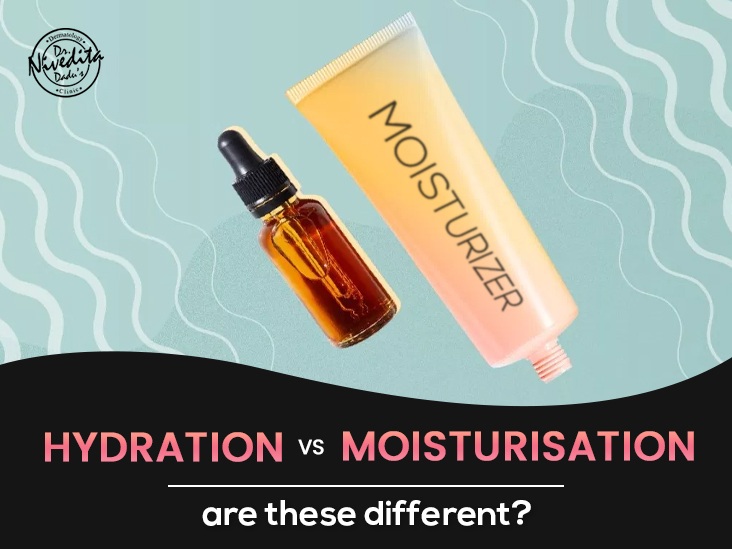Hydration is the key to healthy skin. Many people who face the problem of dry skin or dehydrated skin are worried about the hydration factor of the skin. But hydrating the skin is similar to hydrating the body. It helps to make it healthy and look fresh. This has nothing to do with skin type or skin condition.
Then what is skin hydration and is it different from moisturising the skin?
Even after applying hydrating products why does skin need a moisturiser?
How can one decide the dose of moisture that is required?
For this, we first need to clear the haze that has been created by common marketing terms that are 'hydrators' and 'moisturisers'. Technically speaking moisturiser is an umbrella that covers a range of terms like oils or emollients, humectants, and occlusives. Most of the brands use these two words as synonyms while marketing. But truly speaking there is no gold standard differentiation between a hydrator and moisturiser; these terms are used to differentiate how the skin gets the moisture it needs from them.
Water is hydrating but it doesn’t work as a good moisturiser as it can keep skin moisturised only till it evaporates and it can also rip off the natural oils from the skin along with it. Hence, one needs something stronger than water to keep the skin moisturised for longer durations. Generally, occlusive are the ones that keep skin moisturised for longer durations.
Moisturisers are oil-based products that majorly consist of one of the occlusives like petroleum jelly, mineral oil or emollients. They work by sealing in the moisture on the skin surface and prevent evaporation of water. Thus, locking in the moisture and natural oil of the skin. On the other hand, hydrators are majorly the humectants that absorb moisture from the atmosphere and keep the skin hydrated. These consist of glycerine and hyaluronic acid.
We need to understand how these two work as skin’s requirements can vary depending on its present condition and if not chosen wisely they can break the skin’s barrier as well. Though the end goal of both is the same that is to keep skin hydrated. Most skin lotions available in the market contain both occlusive and emollients or humectants. This is to ensure that they moisturise and hydrate at the same time. The various forms like gel, balm, cream oil, etc. don’t affect the efficacy of the product it’s just the convenience of application that differs with formulations majorly. Depending on skin type skin’s preference for moisturiser and hydrator will vary. Here is how to identify which skin type requires which ingredients:
1. Very Dry Skin
A thick moisturiser is their demand. When the skin is naturally very dry in nature and has a tendency to become flaky and peel off then it’s not the weather caused dehydration but it’s the skin that is unable to retain moisture well. This type of skin needs a protective seal so as to lock in moisture like petroleum jelly or occlusive that works better in this condition. Other options like shea butter, coconut oil, jojoba oil, etc. also work better for dry skin.
2. Dehydrated Skin
Hydrating serum is the solution. If the skin is not super dry but only dehydrated then one just needs to ensure that they add water back to the skin. The hydrating serum which has the ability to retain water is best for dehydrated skin. Hyaluronic acid is one such ingredient that works wonders and gives a healthy dose back to the skin. Alternatively aloe vera gel and honey also work well.
3. Oily Skin
Oily skin doesn’t mean no moisture required or skin cannot be dehydrated. People with oily skin can have compromised barrier functions making it difficult to retain moisture. In the case of oily skin, moisture leaves skin surface making it produce more and more oil. This cycle will continue until one will break it by providing the skin proper moisture and hydration. Water-based, non-comedogenic hydrators that are lighter will serve the purpose. They will also ensure the non-clogging of pores as well.
What ensures that the product will be moisturising or hydrating?
When the idea is to keep the skin hydrated both work well for the skin whether a hydrator or moisturiser. As explained above oils like nut oil, seed oil, almond oil, mineral oil, jojoba oil, rose-hip oil, or shea butter, lanolin are all moisturisers whereas aloe vera gel, hyaluronic acid, glycerine, honey, lactic acid, that absorb moisture from the air are hydrators.
Using both will not hamper the skin in any way. One can just hydrate the skin by using humectants and then use an occlusive to seal in the moisture. To keep it more simple lookout for products that contain both the ingredients.
So, to keep the skin hydrated, plump and glowing all around the year one needs to know what to use when and a dermatologist can help to choose the best as per individual skin type.
Keep Healthy! Keep Glowing!

